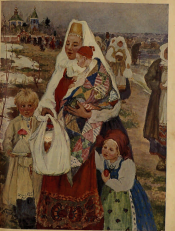
Presidential Library tells about Easter traditions in Russia
On 20 April 2025, Orthodox Christians will celebrate the Bright Resurrection of Christ, Easter, the most important and solemn Christian holiday.
During Holy Week, the week before Easter, believers remember the last days of the Saviour's earthly life: His sufferings, crucifixion, death on the cross and burial (in Church Slavonic, the word "passion" means suffering). All the days of Holy Week are called Great Days.
The Presidential Library's portal presents rare materials telling about the traditions of this holiday. An interesting description of Easter preparations in the villages of Malorossiya in the mid- to late 19th century is provided by manuscripts of the Russian Geographical Society.
The liturgy is followed by a general solemn funeral service, during which all the deceased relatives recorded in the "literatures" are commemorated. It is worth noting that these memorial books contain thousands of names, which pass from family to family, surviving for a hundred years or more. Among the "gramotokas" there are also "written in semi-Ustvo (a form of Cyrillic alphabet developed in the second half of the XIV century), with fanciful vignettes and title design". On the same day a special "sequence of the great and glorious Passion of the Lord with the reading of the twelve Gospels and twelve times of bell-ringing in all labour" is celebrated. Those who like to ring "climb the belfry in advance and try hard". There are no customs attached to Good Friday. Nor is Saturday rich in beliefs. And now comes the momentous, great and holy night. The sound of the bells wafts through the fresh night air, proclaiming to the whole world joy and gladness at the coming of "the feast of feasts and the triumph of feasts". Everyone who wishes to sing, and "the earthly choir is amicably echoed from on high by countless hosts of angels".
Pavel Rossiev, a member of the Russian Geographical Society, collected Easter omens in Zemlyany uyezd, Voronezh province. His handwritten texts are available in the collection of the Presidential Library. Here are some of them, dating back to 1913: "To forget to take out of the oven bread that has just been baked is to bring misfortune upon oneself. On Holy Saturday one does not lend anything, as it is asked not out of need, but for the sake of witchcraft. The shells of eggs consecrated on Holy Night are sewn up in a cloth and worn together with a cross as a remedy for fever.
Dyed eggs are an obligatory attribute of the Easter feast. "Nowhere in Orthodox Russia dyed eggs do not enjoy such honour, and their production itself does not reach such a degree of perfection and originality of execution, as in the southern Slavs - wrote the illustrated magazine of literature, politics and modern life Niva, whose issue in 1912 was dedicated to the Easter holiday. - Some Slavic peoples have a real cult of Easter eggs, surrounded by ancient legends and many special customs. There eggs are not just painted, they are written, i.e. painted with the help of special techniques. Hence the name "pysanky".
There are many legends about the origin of Easter eggs. According to one of them, "drops of the blood of the crucified Christ, falling to the ground, took the form of hen's eggs and became hard as stone. The hot tears of Our Lady, who wept at the foot of the Cross, fell on these blood-red eggs and left traces on them in the form of beautiful patterns and coloured specks. When Christ was taken down from the Cross and laid in the tomb, the believers collected his tears and shared them among themselves. And when the glad tidings of the resurrection spread among them, they greeted each other, "Christ is Risen," while passing Christ's tears from hand to hand. After the Resurrection, this custom was strictly observed by the first Christians, and the sign of the greatest miracle - the tears-eggs were strictly kept by them and served as an object of joyful gift on the day of Holy Sunday".
The 1890 edition of Holy Week (Great Monday, Great Tuesday, Great Wednesday, Great Thursday, Great Friday, Great Saturday) and Easter quotes the words of the Christian theologian and philosopher St Gregory of Nyssa about "how the great feast of Easter was celebrated in ancient times in family, social and civil life". He wrote: "Today the whole universe, as one family, gathered for one occupation, leaving ordinary affairs, as if by a given sign, turns to prayer. There are no travellers on the roads; no sailors are seen on the sea; the farmer, having left his plough and tread, has adorned himself with festive clothes; the taverns stand empty, the noisy gatherings have disappeared, as winter disappears with the appearance of spring; the worries, confusions and storms of everyday life have been replaced by the silence of the holiday".
More interesting materials dedicated to the celebration of the Bright Resurrection of Christ are available on the Presidential Library's portal.

